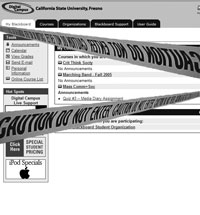Editorial: The good and the bad of Blackboard
Illustration by
Ryan Tubongbanua
 Blackboard was created to provide an easy, digital way for teachers to offer class notes, assignments and even tests and quizzes to all of their students without having to print them off in mass copies. Blackboard was created to provide an easy, digital way for teachers to offer class notes, assignments and even tests and quizzes to all of their students without having to print them off in mass copies.
Anyone looking at the surface of this system might say it is a great idea. And why shouldn’t they? An easy way to provide students with needed information without wiping out a forest worth of paper.
But anyone who takes a deep, hard look at this system will realize that it is not as great as it is hyped up to be. It actually just takes the pressure of having the class material handy and the cost of paper and ink off of the university and places it on the already academically and financially strained students.
Blackboard hasn’t helped cut down on mass copying. It just put the guilt of killing trees and the strain of resources on each individual student. Whether they have to constantly buy the ink and paper to feed their printers or they have to keep recharging their ID cards for the copy machines, students are feeling the financial burden of having to produce the hard copies themselves.
Professors can now place all of the class reading assignments, class notes and homework assignments on Blackboard. Then the professors just reread the notes posted on Blackboard as the class lesson. This eliminates the need to come to class and obtain the materials and notes first-hand.
To make matters worse, professors make policies where students get docked points if they don’t attend class regularly. If you want students to come to class, have some academic incentives in attending.
Whose life is improved or made simpler by the digital campus and Blackboard? Teachers are burdened with the task of updating the assignments regularly and they’re made lazy by the lack of preparation needed for class sessions. Students are burdened with the cost of printing up class materials daily and they lose sight of the value of interactive learning. And students and professors alike are at the mercy of the server system if it crashes, as it has in the past.
What is in store for the future? What is going to happen to the university campus system when all classes and material are online and there is no need to physically go to school or hire professors to teach?
It is time to revert to the good old days when teachers were responsible for being prepared with class handouts and with teaching the material rather than just uploading it. Back to a time when students came to class to get the notes, the assignments and the benefits of socially interacting with their peers and not just avoiding being penalized for not attending.
It is time to realize implementing technology that serves to simplify is not always in our best interest and to take caution as to what Blackboard is doing to students, professors and the college system.
|
